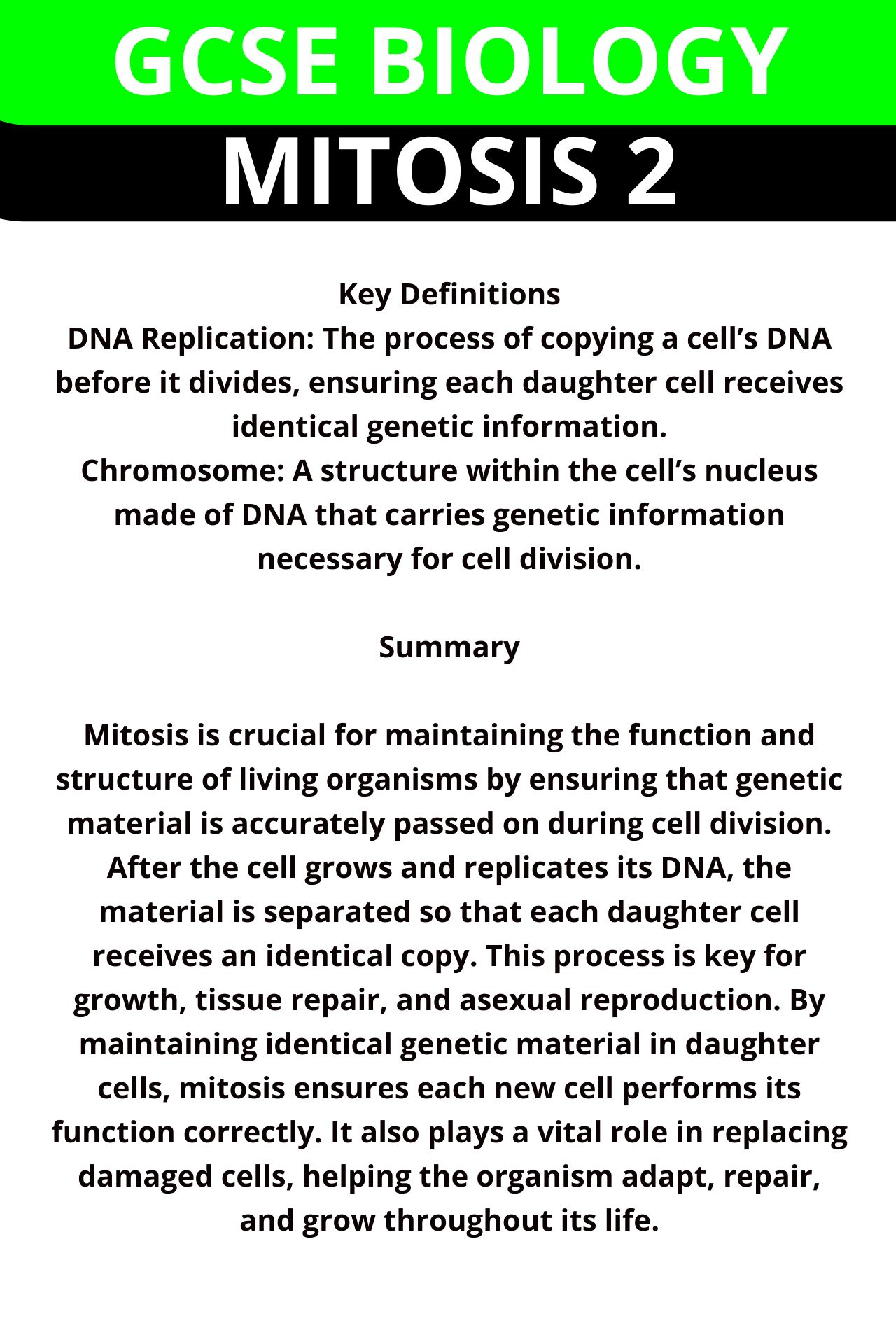- Free GCSE Science Quiz Newsletter
- Posts
- 🧬 GCSE Biology Revision Newsletter - More Mitosis
🧬 GCSE Biology Revision Newsletter - More Mitosis
Focus: Mitosis In Exam Questions

Part 1 - Keywords:
Cell Cycle
Mitosis
Cell Division
Growth
Development
DNA Replication
Chromosomes
Multicellular Organisms
Genetic Material
Part 2 - Key Facts:
The cell cycle consists of three main stages: growth and DNA replication, mitosis, and cell division.
Mitosis is the process by which a cell divides to produce two identical daughter cells, essential for growth and development.
During the first stage, the cell grows and replicates its DNA to ensure that each daughter cell will have a complete set of chromosomes.
In mitosis, the replicated chromosomes are separated, with one set pulled to each side of the cell, ensuring each new cell has the same genetic material.
The final stage involves the division of the cytoplasm and cell membrane, resulting in two identical cells.
Mitosis is crucial in repairing damaged tissues and replacing worn-out cells in multicellular organisms.
Part 3 - Quick Quiz:
Which of these is the primary purpose of mitosis?
A) Energy production
B) Genetic variation
C) Growth and development
In the cell cycle, which stage directly follows DNA replication?
A) Mitosis
B) Growth
C) Cell death
What happens during the final stage of the cell cycle?
A) DNA is replicated
B) The cell divides
C) Chromosomes are destroyed
Answers:
C
A
B
Part 4 - Going Further:
Question: Describe a situation where mitosis is essential in the body and explain why it’s important.
Answer: Mitosis is essential for repairing a cut on the skin. When the skin is damaged, cells around the wound begin to divide rapidly through mitosis, producing new cells that help close and heal the wound. This process ensures the body can repair tissue and maintain a protective barrier against infection, which is vital for overall health.
Part 5 - Revision Tips:
To better understand mitosis, try visualising or drawing the stages of the cell cycle, focusing on how cells duplicate and then divide to maintain the body’s function and structure.
Part 6 - More Help:
Here are resources for GCSE Physics students revising the topic of mitosis:
Webpage: "Mitosis Revision Notes and Practice Quiz"
URL: https://www.gcse.co.uk/biology/mitosis
Description: This page provides a detailed overview of mitosis, including its role in cell division, stages of the cell cycle, and a quiz to test understanding.Webpage: "BBC Bitesize - Mitosis and Cell Cycle"
URL: https://www.bbc.co.uk/bitesize/topics/mitosis-and-cell-cycle
Description: An interactive revision guide explaining the mitosis process, the cell cycle, and chromosome duplication, along with visual aids and practice questions.YouTube Video: "GCSE Biology Revision - Cell Division by Mitosis"
URL: https://www.youtube.com/watch?v=I0VdEiPWkHs
Description: This video covers the fundamental stages of mitosis in a visual format, ideal for reinforcing understanding through clear explanations and illustrations.
WANT 25% Off GCSE Science And Math Tuition OR Past Paper Revision Resources? Click this link - piacademy.co.uk and use this COUPON CODE - GCSE25.
These resources provide a mix of in-depth reading, visual aids, and quizzes to help students consolidate their knowledge of mitosis for GCSE Physics.
Part 7 - GCSE Science Flik Notes
If you are on mobile hold your finger over the image and click ‘save as’ or make it full screen and take a screen shot. You can then have these notes saved on your phone at all times.

Stay tuned for the next issue, where we’ll explore more GCSE Chemistry.
Reply